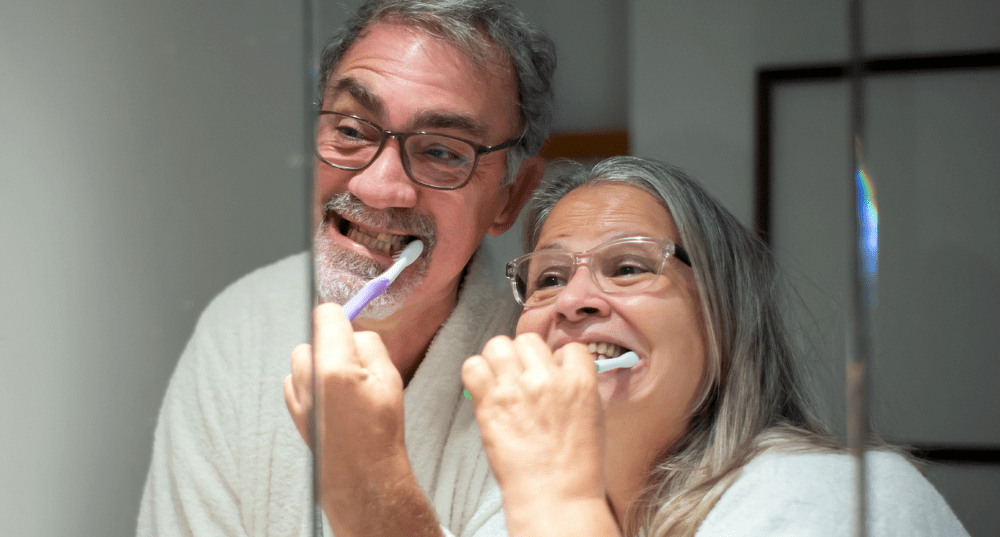The Caregiver’s Guide to Oral Care

As a caregiver with an endless list of concerns and responsibilities, your loved one’s dental care can sometimes be overlooked. Some older adults need to be reminded to brush and floss their teeth and for others with arthritis, dementia or serious health concerns, they may no longer be able to provide oral care for themselves.
While supporting the dental needs of another person can be overwhelming, poor oral health can cause infections, aggravate pre-existing conditions and negatively affect quality of life. You should always talk to a dental professional before starting a new oral health routine, and your loved one may have very specific needs, but here are some general mouth care reminders for caregivers.
Caring for Natural Teeth
Flossing
- The easiest position to floss someone else’s teeth is to have them lie down on a bed while you kneel or sit beside them.
- Using about 18 inches of floss, wind the floss around your middle fingers and hold it tightly between your thumbs and index fingers.
- Gently slide the floss up and down between the teeth and curve the floss around the base of each tooth.
- Use a clean section of floss for every tooth.
If flossing is too challenging, a water flossing machine like a Waterpik or flossing tools including threaders, interdental brushes or a plastic floss holder may be helpful. These can all generally be purchased at a local drug store.
Brushing
- Stand behind your loved one while they are in front of the sink. Or if your loved one is in a bed, raise the head of the bed or prop them up with pillows, drape a towel over their chest and have water and a bowl within arm’s reach for rinsing.
- Use a pea-sized amount of fluoride toothpaste and brush each tooth surface (front, back and top) using short strokes; giving extra, gentle attention to the gumline.
- Gently brush the tongue but watch how far back you go to prevent gagging.
- Help the person you are caring for rinse their mouth with warm water and spit into the sink or bowl. If there’s a risk of choking, rather than rinsing, swab the mouth with a damp cloth or moistened gauze.
- Your dentist may also recommend an oral rinse, which involves your loved one swishing and spitting, as directed.
Electric toothbrushes require less dexterity and do a better job of removing plaque, food and bacteria. Some people are bothered by the vibrations, so try a disposal electric toothbrush before committing to a more expensive model with replacement heads. If your loved one is able to brush their teeth on their own but are struggling with coordination, try adaptive toothbrushes with a longer handle, angled brush or a removable rubber grip.
Caring for Complete or Partial Dentures
People who wear dentures also need good oral care to prevent issues like bad breath and infections. Always talk to a dentist or denturist about the best way to care for your loved one’s dentures, but here are a few tips:
- Scrub dentures with a denture brush, paste and warm water at least once a day. Avoid regular toothpaste as it can scratch the surface and hot water that can cause warping.
- Encourage a drink of water after every meal to keep dentures and mouth clean.
- Remove dentures at night and soak them in warm water or a denture cleaning solution. Never use denture cleansers inside the mouth.
- Clean gums, tongue and any remaining teeth using a soft toothbrush or wet cloth twice a day (see more on mouth tissue care below).
- Rinse dentures thoroughly in running warm water before using them again in the morning.
- Regularly inspect your loved one’s dentures and contact a professional if you notice any chips, cracks or comfort issues.
Caring for Mouth Tissues
If your loved one has no teeth, it’s still important to brush their gums and tongue in the morning and at night to prevent gum disease. Here’s how:
- Use a soft, wet toothbrush without toothpaste to remove plaque, food particles and to stimulate the gums.
- If this is painful, use a finger wrapped in a clean, damp cloth.
- Don’t forget to brush the tongue while watching for your loved one’s gag reflex.
- Report any ulcers, swelling, redness or colour changes in oral tissues to a dental professional.
Regularly Check In
These dental tips are for at-home care, but your loved one should also get a dental exam and cleaning every six months. Dental professionals can also help detect more serious issues such as receding bone levels which can affect the fit of a denture, oral cancer which is often painless and gum disease which can create a lot of other health problems.
Like many of your duties as caregiver, oral health requires patience and dedication. Connect with your loved one’s dentist to develop a routine that works for you and the person you are caring for.
If you’re not comfortable with these tasks, a paid caregiver can assist with your loved one’s oral care at home. Contact VHA’s Enterprise Health Solutions team at 416-489-2500 ext. 4649 or by email at ehs@vha.ca for more information on how we can help.
